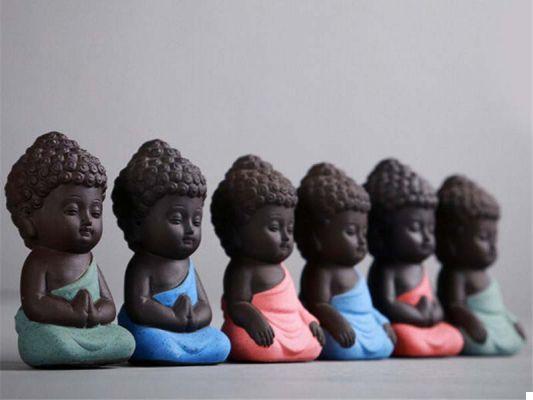
A Zen disciple complained that he could not meditate: his thoughts prevented him. He was desperate, he didn't know what to do, so he decided to tell his teacher to find a solution:
- Master, thoughts and mental images do not allow me to meditate. They disappear for a few seconds but then come back with more force. I can't meditate. They don't leave me alone.
The master explained to him that this situation depended on himself and that he had to stop thinking about it.
But the disciple was not satisfied with the answer. He kept complaining that his thoughts weren't leaving him and that his mind was confused. Every time he tried to concentrate, a train of thoughts and reflections, often useless and banal, exploded in his mind ...
Then the master told him:
- Good. Take that spoon and hold it in your hand. Now sit down and meditate.
The disciple did not understand the purpose of that strange suggestion, but he obeyed. After a while, when the master noticed that the young man felt very uncomfortable holding the spoon in his hand and could not meditate, he ordered him:
- Leave the spoon!
The student loosened his grip and the spoon fell to the floor. He looked at his teacher in amazement, not understanding what had happened. He said to him:
- Now tell me, who was grabbing who? Was it you grabbing the spoon or was it the spoon grabbing you?
Why do we cling to what makes us suffer?
In life, we often behave like the disciple of this story: we cling to the things that harm us, and then we complain because they make us suffer. It can be a relationship that has become toxic, a job that represents a huge burden of stress and dissatisfaction, a harmful lifestyle, or even a past event for which we feel guilty.
These emotional loads prevent us from moving forward, they are like salt on a wound, it prevents it from healing. We generally cling to situations that harm us for fear of leaving our comfort zone, a space that can be uncomfortable but we know. It involves choosing a "bearable" pain over the uncertainty that the unknown represents.
To keep ourselves in that comfort zone, we make excuses, often subconsciously. We decide to focus on the benefits that the situation still offers us, to which we place a disproportionate importance that does not compensate for the damage it is doing to us. In practice, we let ourselves be dazzled by the small advantages so as not to see the greatest damage and therefore not have to make a decision.
We tell ourselves we're not that bad. That we have exaggerated. And so we continue to cling to what hurts us. To return again to the cycle of complaints. It is an unhealthy balance that we must abandon as soon as possible because, in the long term, not only our mental health will suffer but also our physical one.
How to close the cycles and heal emotional wounds?
“I am not what happened to me, I am what I chose to be,” said Carl Gustav Jung. We don't have control over the things that happen to us, but we can decide how to react, what meaning to give it and what impact they will have on us.
We can take the reins and let go of what hurts us or simply complain about our misfortunes, misfortunes or incapacities, like the disciple of history. Without ever realizing that part of the solution is in our hands.
One of the strategies for closing harmful cycles is to realize that we are the ones who hold onto those situations. For some reason, we don't let them go, but we go back to them all the time. The curious fact is that the more we complain, the more dissatisfaction and damage these situations will cause us.
And the more we try to erase those thoughts or memories in our mind, the more they will strengthen because a mechanism is activated that continually brings us back to the contents we want to remove. This is what is known in Psychology as the "Rebound Effect".
Therefore, radical acceptance is one of the most effective ways to heal wounds and stop hurting ourselves. Accepting is like dropping the spoon. When we accept something, we get rid of its influence because it implies that we are fully aware and ready to change. Accepting involves stopping making excuses and lying to grab onto what harms us.
After all, who grabs whom? Did you get hold of the problem or was it the problem that grabbed you?
- 147


























